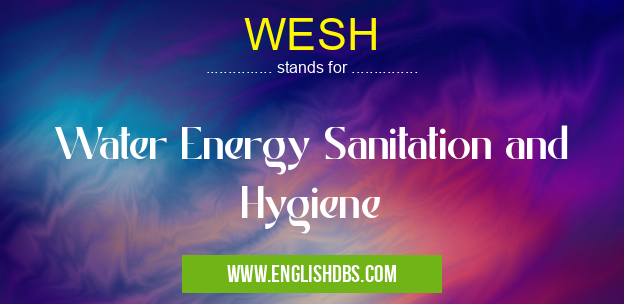What does WESH mean in ENERGY
WESH stands for Water, Energy, Sanitation, and Hygiene. It encompasses a broad range of interventions and practices aimed at improving public health and well-being, particularly in developing countries.

WESH meaning in Energy in Governmental
WESH mostly used in an acronym Energy in Category Governmental that means Water Energy Sanitation and Hygiene
Shorthand: WESH,
Full Form: Water Energy Sanitation and Hygiene
For more information of "Water Energy Sanitation and Hygiene", see the section below.
» Governmental » Energy
What does WESH Stand for?
WESH consists of four essential components:
-
Water: Access to safe and clean drinking water is crucial for preventing waterborne diseases and maintaining overall health.
-
Energy: Adequate energy supplies, including electricity and clean fuels, are essential for powering healthcare facilities, water treatment plants, and other essential services.
-
Sanitation: Proper sanitation practices, such as access to toilets and waste management systems, help prevent the spread of diseases and improve environmental hygiene.
-
Hygiene: Good hygiene habits, including handwashing and personal hygiene, are essential for preventing infections and promoting health.
WESH in Governmental Context
WESH is a key focus area for governments and international organizations working to improve public health and reduce poverty. The United Nations has set ambitious goals for achieving universal access to WESH services by 2030.
Essential Questions and Answers on Water Energy Sanitation and Hygiene in "GOVERNMENTAL»ENERGY"
What is Water Energy Sanitation and Hygiene (WASH)?
WASH refers to the integrated approach to providing access to clean water, sanitation, and hygiene services, with the aim of promoting health and preventing diseases.
Why is WASH important?
WASH is essential for public health and well-being. It helps prevent waterborne diseases, improves sanitation and hygiene practices, and reduces the burden on healthcare systems.
What are the key components of WASH?
WASH encompasses several key components, including:
- Access to clean and safe water sources
- Adequate sanitation facilities, such as toilets and latrines
- Proper hygiene practices, such as handwashing and menstrual hygiene management
How does WASH contribute to sustainable development?
WASH plays a crucial role in achieving several Sustainable Development Goals (SDGs), including:
- Goal 3: Good Health and Well-being
- Goal 6: Clean Water and Sanitation
- Goal 11: Sustainable Cities and Communities
What are the challenges in implementing WASH programs?
Some challenges faced in implementing WASH programs include:
- Limited access to financial resources
- Geographic and infrastructural constraints
- Cultural and behavioral barriers
- Lack of political will and commitment
What are the potential benefits of investing in WASH?
Investing in WASH programs can yield significant benefits, such as:
- Improved health outcomes and reduced mortality rates
- Increased economic productivity and reduced healthcare costs
- Enhanced educational attainment and social development
How can individuals contribute to WASH efforts?
Individuals can support WASH initiatives by:
- Practicing good hygiene habits
- Conserving water and energy
- Advocating for WASH policies and programs
- Supporting organizations working in WASH
Final Words: WESH is a comprehensive approach to improving public health and well-being, especially in resource-constrained settings. Access to clean water, adequate energy, proper sanitation, and good hygiene practices are essential for promoting healthy communities and reducing health disparities worldwide.
